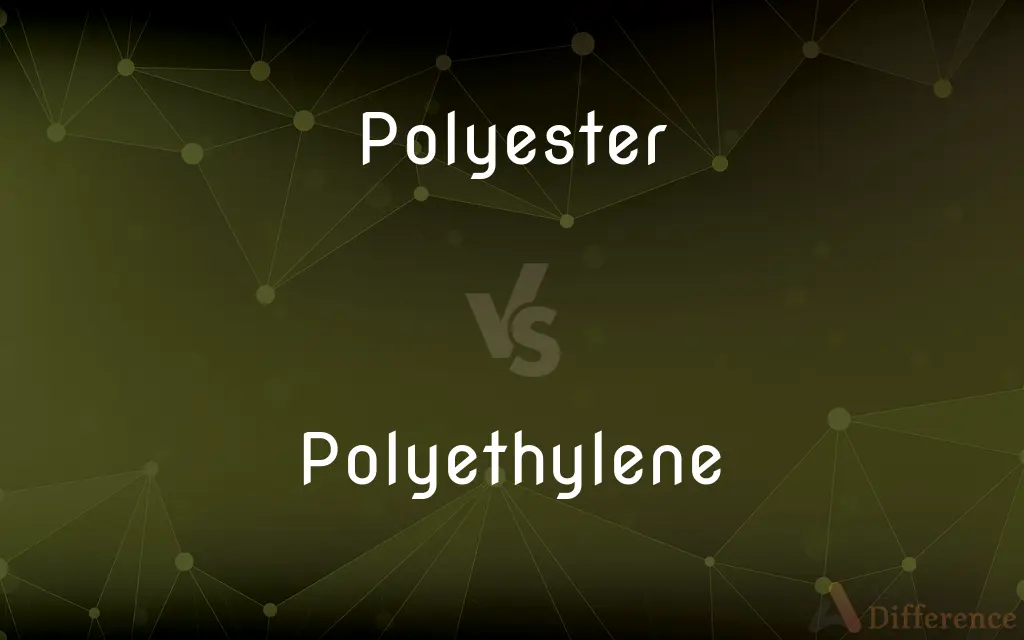Polyester vs. Polyethylene — What's the Difference?
By Tayyaba Rehman — Updated on August 29, 2023
Polyester is a synthetic fabric or fiber, while polyethylene is a type of plastic polymer.

Difference Between Polyester and Polyethylene
Table of Contents
ADVERTISEMENT
Key Differences
Polyester is a category of polymers used mainly in textiles and clothing, produced by polymerizing ester molecules. Polyethylene, on the other hand, is a type of plastic and is one of the most commonly used polymers, made from ethylene monomers.
One key distinction between polyester and polyethylene lies in their applications. Polyester fabrics are widely popular in the fashion industry and for household items like curtains, while polyethylene is predominantly used for making plastic bags, bottles, toys, and more.
From a structural perspective, polyester contains an ester functional group in its main chain, which provides it with specific characteristics suitable for fabric creation. Polyethylene is composed of simpler structures, making it versatile for various molding processes and applications.
When considering environmental impact, both polyester and polyethylene are derived from petrochemicals. Polyester, being used in textiles, has been under scrutiny for microplastic pollution, especially when washed. Polyethylene, being a plastic, contributes to the larger plastic pollution issue, especially single-use polyethylene products.
In terms of recycling, both polyester and polyethylene are recyclable. Recycled polyester is often seen in clothing and textiles, while recycled polyethylene finds its way into new plastic products.
ADVERTISEMENT
Comparison Chart
Primary Usage
Used mainly in textiles and clothing.
Used for making plastic products.
Molecular Structure
Contains an ester functional group.
Simpler structure derived from ethylene monomers.
Environmental Concerns
Microplastic pollution when washed.
Plastic pollution, especially single-use items.
Origin
Derived from petrochemicals using ester molecules.
Derived from petrochemicals using ethylene.
Recycling
Can be recycled into new textiles.
Recycled into new plastic products.
Compare with Definitions
Polyester
A synthetic resin used in textile fibers and fabric.
The shirt is made of 100% polyester.
Polyethylene
A common type of plastic polymer.
The shopping bag is made of polyethylene.
Polyester
A category of polymers containing ester functional groups.
Polyester resins are used in boat construction.
Polyethylene
Derived from the polymerization of ethylene.
Polyethylene production starts with ethylene gas.
Polyester
A material used for its wrinkle-resistant property.
I prefer polyester curtains because they don't crease easily.
Polyethylene
Used in a variety of containers and toys.
The child's toy set is crafted from polyethylene.
Polyester
A fabric that can retain its shape and resist stains.
The polyester tablecloth remained unstained despite the spill.
Polyethylene
Available in varying densities like LDPE and HDPE.
HDPE bottles are sturdier than LDPE ones.
Polyester
Any of numerous synthetic polymers produced chiefly by reaction of dicarboxylic acids with dihydric alcohols and used primarily as light, strong, weather-resistant resins in boat hulls, textile fibers, adhesives, and molded parts.
Polyethylene
A component in some flexible tubing and films.
The polyethylene film protected the furniture from paint splatter.
Polyester
Polyester is a category of polymers that contain the ester functional group in every repeat unit of their main chain. As a specific material, it most commonly refers to a type called polyethylene terephthalate (PET).
Polyethylene
Polyethylene or polythene (abbreviated PE; IUPAC name polyethene or poly(methylene)) is the most common plastic in use today. It is a polymer, primarily used for packaging (plastic bags, plastic films, geomembranes and containers including bottles, etc.).
Polyester
A synthetic resin in which the polymer units are linked by ester groups, used chiefly to make synthetic textile fibres.
Polyethylene
A polymerized thermoplastic ethylene resin, used especially for containers, kitchenware, and tubing, or in the form of films and sheets for packaging.
Polyester
A material or fabric made from polyester polymer
Polyethylene
(organic compound) A polymer consisting of many ethylene monomers bonded together; used for kitchenware, containers etc.
Polyester
Any polymer whose monomers are linked together by ester bonds
Polyethylene
A lightweight thermoplastic; used especially in packaging and insulation
Polyester
Of, or consisting of polyesters
Polyester
Any of numerous synthetic resins; they are light and strong and weather resistant
Polyester
A complex ester used for making fibers or resins or plastics or as a plasticizer
Polyester
Any of a large class of synthetic fabrics
Polyester
A wrinkle-resistant fabric of fibers made from any of these resins.
Polyester
A component in some plastic bottles and films.
Some beverage containers contain polyester for improved flexibility.
Common Curiosities
Can polyethylene be used in clothing?
While less common, polyethylene can be found in some specialized clothing items.
Which one is more eco-friendly, polyester or polyethylene?
Both have environmental concerns, but their impacts differ based on usage and disposal.
Is polyester a type of plastic?
Yes, polyester is a type of plastic used mainly in textiles.
Can both polyester and polyethylene be recycled?
Yes, both can be recycled, though recycling availability may vary by region.
Is polyester breathable?
Polyester is less breathable than natural fibers like cotton.
What is the difference between LDPE and HDPE?
LDPE (Low-Density Polyethylene) is softer and more flexible, while HDPE (High-Density Polyethylene) is sturdier and more rigid.
What are common uses of polyethylene?
Polyethylene is commonly used in plastic bags, bottles, toys, and more.
Are both derived from petrochemicals?
Yes, both polyester and polyethylene are derived from petrochemicals.
Are polyester fabrics resistant to stains?
Yes, polyester fabrics tend to be more stain-resistant than some natural fibers.
Can polyester be blended with other fibers?
Yes, polyester is often blended with fibers like cotton to enhance fabric properties.
Share Your Discovery

Previous Comparison
Carpet vs. Drugget
Next Comparison
Reinstatement vs. ConstructionAuthor Spotlight
Written by
Tayyaba RehmanTayyaba Rehman is a distinguished writer, currently serving as a primary contributor to askdifference.com. As a researcher in semantics and etymology, Tayyaba's passion for the complexity of languages and their distinctions has found a perfect home on the platform. Tayyaba delves into the intricacies of language, distinguishing between commonly confused words and phrases, thereby providing clarity for readers worldwide.















































